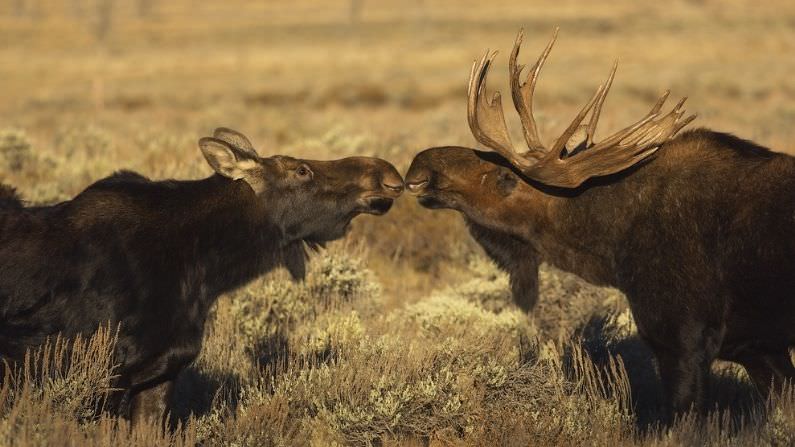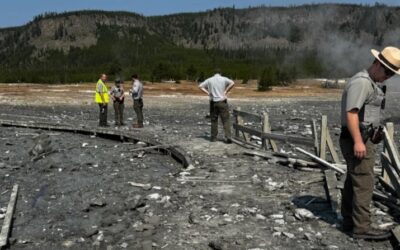Petito Case Helps Lead to Additional Missing Person Discovery
A body found on Teton Pass Tuesday afternoon fits the description of Robert “Bob” Lowery, a 46-year-old Houston man who had been missing since late August. No cause of death has been determined yet, and the man’s official identity is pending an autopsy, but Lowery’s family has been notified of the discovery. Teton County Search and Rescue led the search effort, and Communications Director for the TCSAR Foundation Matt Hansen said it was a difficult day for everyone involved with the case.
“It’s not the result that anybody wants. But at the very least, the search and rescue team can provide at least some sort of closure to the family,” Hansen said.
About 25 volunteers and three dogs scoured the area, with the remains being found by a canine search team on a 45 degree, thick wooded slope that’s difficult to get in and out of, according to a TCSAR press release.
Lowery’s case had gone cold in recent weeks, but the Gabby Petito investigation, which made national headlines, actually shed light on other missing persons in Jackson, including Lowery. That prompted two people to call the Teton County Sheriff’s Office with new clues over the weekend, which led to Tuesday’s search party near the Black Canyon Trail.
“The search for Gabby helped elevate, you know, and shed light on these other cases, which is good for different people who have missing loved ones,” Hansen said.
TCSAR volunteers covered more than 75 miles and at least 22,000 feet of elevation during the search and spent Tuesday afternoon recovering the body.
Rep. Cheney Says She Was ‘Wrong’ On Same-Sex Marriage
Wyoming Congresswoman Liz Cheney appeared on 60 Minutes Sunday to discuss her opposition to former President Donald Trump and her 2022 reelection campaign. She also said she was wrong to oppose same-sex marriage in the past, showcasing a clear change of heart from her previous viewpoints.
“We have to recognize as human beings that we need to work against discrimination,” Cheney said. “In our country and in our state.”
Cheney’s sister, Mary, is married to a woman, which caused a rift in the family in the past. But the two have since reconciled, with Cheney also expressing support for the transgender community during the Sunday interview. However, despite the newfound outspokenness, Cheney voted in February against the Equality Act, which would ban discrimination based on sexual orientation and gender identity.
Cheney’s primary challenger, Harriet Hageman, called her a “liberal hero” in an accusatory campaign email designed to solicit donations following the 60 Minutes appearance.
Town Council Members Hear from Constituents
Members of the Jackson Town Council held their second informal “Chat with Council Members” event by Zoom Wednesday. The new monthly series is a chance for individual council members to talk with local residents, but the meetings are not officially part of the public record. Wednesday’s virtual event was attended by Jackson Vice Mayor Arne Jorgensen and Council Member Jessica Sell Chambers. The pair heard concerns on a wide range of issues from area locals, including Dave Meaney and Mary Lynn Callahan.
“I’ve got two issues that are of concern. I was hoping to get your perspectives on it. The first is related to the rodeo grounds. Hearing that there are some potential changes under consideration,” Meaney said.
“I have some friends who have businesses downtown who are having a lot of trouble with the new construction, specifically over by the Center for the Arts there,” Callahan said. “And they’re losing renters because of the noise and parking.”
In regards to the rodeo grounds, Jorgensen said no decisions have been made and that it will be a long community discussion to decide what the best use is for the land that the town currently leases to the rodeo and Teton County Fair. Those leases will be up in 2026, according to the vice mayor.
“It is not an effort to not have a fair or not have a rodeo at all. It is simply a recognition that this is a significant asset for the Town of Jackson and are there other uses, such as housing, that might go there if a suitable site could be found in the county?” he said.
For her part, Sell Chambers said she’s leaning toward building housing on the property because of the severity of Jackson’s housing crisis.
“We as a community have to decide what we value. Is it the people and maintaining the working people and the workforce in our community? Or is it retaining some kind of idea of what we consider ourselves to be, as far as what’s Western character and what we see around us? I land on the side of keeping community here,” she said.
Back to the construction question, Jorgensen said Jackson is behind on updating its regulations.
“The current policies that we have in place are not adequate. And whether it’s dealing with noise, hours of construction, seasons of construction, parking, we do have that on our radar in terms of looking at those policies and updating them,” he said.
Another issue discussed Wednesday is the development of a destination management plan for Jackson, a process the councilors say will be ramping up in the coming months. The goal of the plan is to create a holistic guide for how to manage and educate the huge numbers of visitors coming to Jackson Hole.
“We’re gonna drown underneath all of these challenges if we don’t have a comprehensive and cohesive plan moving forward,” Sell Chambers said.
Jorgensen added that other popular tourist destinations that have put successful management plans into place include many locations in California and New Zealand.
The “Chat with Council Members” series is set to continue on the third or fourth Wednesday of each month.
Moose Charges Local Man
A Wilson man was injured and admitted to the hospital last week after getting charged by a bull moose. The man was walking his dog on the bike path near Wilson Elementary School around 7:15 a.m. Friday morning when the moose charged, according to a Monday press release from the Wyoming Game and Fish Department. Public Information Specialist for Game and Fish Mark Gocke said there’s no indication either the man or dog did anything to antagonize the moose, but that the incident is an unfortunate reminder to be extra cautious around both moose and elk this time of year.
“This time of year is the mating season and so the bulls have a lot of hormones going, and they can need a lot more space than we normally would [give them] other times of year,” Gocke said. “They can be cantankerous and aggressive at times.”
While all wild animals can be unpredictable, Gocke said reported injuries from moose are fortunately rare. He also thinks it’s not a bad idea to carry bear spray—even if just walking your dog around town—until the rut ends around late October.
“People have used bear spray effectively against moose when they’ve charged, so it is something to consider,” Gocke said.
Dog owners should also be sure to control their pets at all times when walking in potential wildlife territory. As of Monday, the Game and Fish Department did not have new information on the injured man’s condition.
Regional Drought Data Remains Sobering
The outlook remains grim for the Colorado River basin. A new five-year forecast released last week by the Bureau of Reclamation shows already-historic low levels in Lakes Powell and Mead are on track to keep dropping.
The forecast calls for “critically low” water levels in those reservoirs thanks to decades of drought and low runoff throughout the basin. At Lake Powell, water could get too low to generate hydropower as soon as July of next year—even earlier than past estimates, according to the bureau. One reclamation official said the data was “troubling” and called for more collaborative work.
This latest forecast provides a more dire—but perhaps more accurate—assessment of the river’s future. Models now use more recent data that factors in the effects of climate change.
Alex Hager of KUNC in Greeley, Colorado, contributed reporting to this story.





